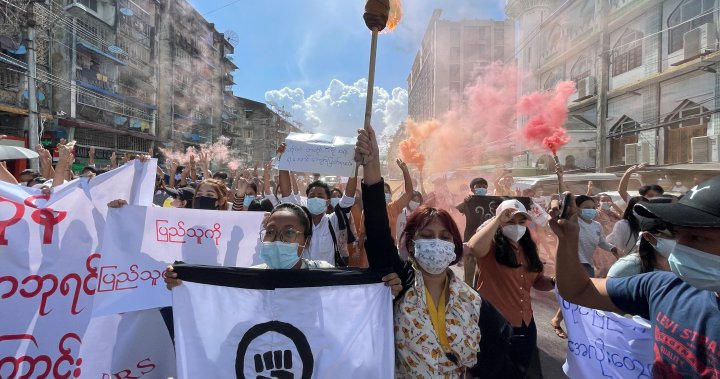
‘Civil war’ has spread throughout Myanmar, United Nations envoy says
Global News
U.N. envoy Christine Schraner Burgener said that the measures could be sanctions imposed by individual countries or by the U.N. Security Council, "but it's up to them."
The outgoing U.N. envoy for Myanmar says “civil war” has spread throughout the country and the international community should consider measures aimed at replacing the military junta’s leaders with people who are more constructive and want to find a peaceful solution to the army’s ouster of the elected government.
Christine Schraner Burgener, whose 3 1/2-year term ends Sunday, said in an interview with The Associated Press that the measures could be sanctions imposed by individual countries or by the U.N. Security Council, “but it’s up to them.”
She proposed the idea of holding “an all-inclusive dialogue” to the deputy commander-in-chief, Vice Senior Gen. Soe Win, on July 16 but never received a response and has not heard from the military since September. She said she thinks the military is determined to win exactly as it did in the past — “but this is not the case anymore, and I hope it will not be the case again.”
Myanmar for five decades had languished under strict military rule that led to international isolation and sanctions. As the generals loosened their grip, culminating in Nobel Peace Prize laureate Aung San Suu Kyi’s rise to leadership in 2015 elections, the international community responded by lifting most sanctions and pouring investment into the country.
The Feb. 1 coup followed November elections which Suu Kyi’s National League for Democracy party won overwhelmingly and the military rejects as fraudulent. Since the military takeover, Myanmar has been wracked by unrest, with peaceful demonstrations against the ruling generals morphing first into a low-level insurgency in many urban areas after security forces used deadly force and then into more serious combat in rural areas, especially in border regions where ethnic minority militias have been engaging in heavy clashes with government troops.
On Sept. 7, the National Unity Government, the main underground group coordinating resistance to the military which was established by elected legislators barred from taking their seats when the military seized power, called for a nationwide uprising. Its “people’s defence forces” known as PDFs operate in many areas and have received training and weapons from some armed ethnic groups.
The PDFs and ethnic armed groups are now up against Myanmar’s military, one of the largest in Southeast Asia with a reputation for toughness and brutality from years of jungle warfare. Although many Western nations maintain an arms embargo against Myanmar, there is no U.N. arms embargo, and the military buys equipment from countries such as Russia, China and Ukraine.
Last week, Schraner Burgener called what’s taking place in Myanmar an “internal armed conflict,” using words from international law.

 Run 3 Space | Play Space Running Game
Run 3 Space | Play Space Running Game Traffic Jam 3D | Online Racing Game
Traffic Jam 3D | Online Racing Game Duck Hunt | Play Old Classic Game
Duck Hunt | Play Old Classic Game











